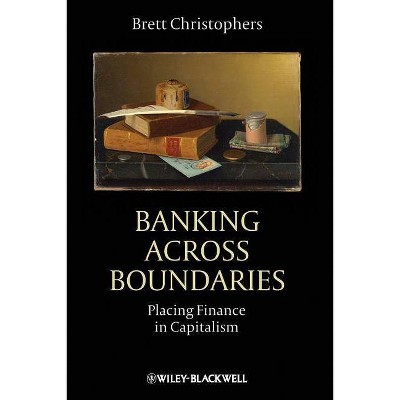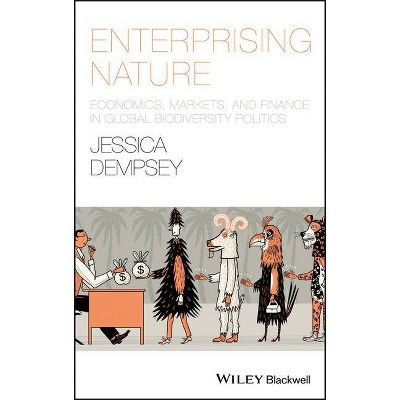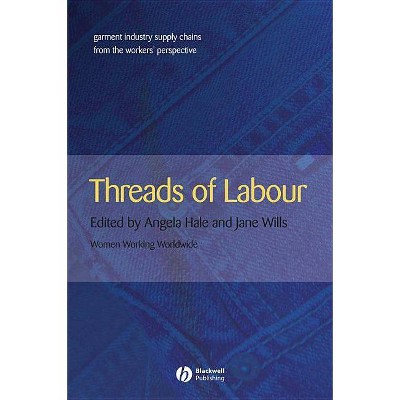Banking Across Boundaries - (Antipode Book) by Brett Christophers (Paperback)

Similar Products
Products of same category from the store
AllProduct info
<p/><br></br><p><b> Book Synopsis </b></p></br></br><p>This compelling contribution to contemporary debates about the banking industry offers a unique perspective on its geographical and conceptual 'placement'. It traces the evolving links between the two, revealing how our notions of banking 'productiveness' have evolved alongside the shifting loci of banking activity.</p> <ul> <li>An original contribution to the urgent debates taking place on banking sparked by the current economic crisis</li> <li>Offers a unique perspective on the geographical and social concept of 'placement' of the banking industry</li> <li> Combines theoretical approaches from political economy with contemporary literature on the performativity of economics </li> <li> Details the globalization of Western banking, and analyzes how representations of the banking sector's productiveness have shifted throughout the evolution of Western economic theory </li> <li>Analyzes the social conceptualization of the nature - and value - of the banking industry</li> <li>Illuminates not only how economic ideas 'perform' and shape the economic world, but how those ideas are themselves always products of particular economic realities</li> </ul><p/><br></br><p><b> From the Back Cover </b></p></br></br>Beginning with the assertion that critiques of the banking industry's economic productiveness are manifestations of a problematic duality that imposes socially constructed oppositions between productive and non-productive and 'real' and financial economies, this unique synthesis of theoretical approaches relates two historical narratives. It details the processes by which Western banking has internationalized, and analyzes how representations of the banking sector's 'productiveness', or otherwise, have taken different forms throughout the evolution of Western economic theory, mutating in tandem with the latter's development. <p>Examining the relationship between these two narratives, the author sheds light on how we, as a society, 'place' banks conceptually; on how banks, as economic institutions, have 'placed' themselves geographically; and on how these two modes of 'placement' have become increasingly intertwined. In the process, the book illuminates not only how economic ideas 'perform' and shape the economic world, but how those ideas are themselves always products of particular economic realities. This original contribution to the perennial debate over the financial services industry will be read with added urgency by scholars spurred on in their analyses by the contemporary financial crisis.</p><p/><br></br><p><b> Review Quotes </b></p></br></br><br><p>"Christophers has produced what is sure to be one of the most widely read books generated by the still-developing subfield of financial geography. Banking Across Boundariesleaves no doubt about the centrality of geography to past debates and present anxieties about the role of finance and banking in "the economy." (<i>The AAG Review of Books</i>, 1 March 2014)</p> <p>"The overall effect is a compelling geopolitical analysis of the historical development of banking that explains present banking institutions and powers, and the political impasse that has permeated Anglo-American capitalist systems since the 2008 financial crisis." (<i>Singapore Journal of Tropical Geography</i>, 24 September 2014)</p> <p>"That said, Christophers has produced an impressive and ambitious piece of scholarship that demonstrates the power of ideas and epistemic communities in shaping the global economy and placed banking more centrally within this. In so doing, Banking across Boundaries will be essential reading for researchers working on the geographies of money and finance and the international financial system within economic geography and cognate disciplines." (<i>Journal of Economic Geography</i>, 5 November 2013)</p> <p><i>Banking Across Boundaries: Placing Finance in Capitalism</i> [is] a probing examination of the boundaries, conceptual and geographic, at stake in financial intermediation. ... [Christophers] succeeds in uncovering fresh connections between material and discursive change, ranging across centuries of financial history, while profitably assimilating various theoretical and empirical literatures, including, but not limited to, critical accounting studies, the sociology of finance, international political economy, and Christophers' home discipline of human geography. It is done with admirable fluency and alacrity.<br /> <b>Jonathan Levy, Princeton University (in <i>Economic Geography</i>) </b></p> <p>Brett Christophers has written a wide-ranging, brilliant, and imaginative book about one of the most important topics in contemporary social science--the role of banks in the contemporary global economy.<br /> <b>Fred Block, Department of Sociology, University of California at Davis </b></p> <p>BAB is an important book that gives us important correctives to established narratives.<br /> <b>Mark Blyth, Political Science, Brown University</b></p> <p><i>Banking Across Boundaries</i> is a theoretically precise and empirically meticulous work of political economy that grapples seriously with the large-scale spatial patterns and dynamics of capitalist development and adds to our knowledge and understanding of them. It belongs on the shelf with works such as Harvey's <i>Limits to Capital</i> (1982), Henderson's <i>California and the Fictions of Capital</i> (1998), and Arrighi's <i>The Long Twentieth Century</i> (1994). ... <i>Banking Across Boundaries</i> should be read not just by economic geographers, political economists, or those concerned with the financial crisis, but by anyone who wants to understand key aspects of the "global" economy. <b>(<i>Geographical Review</i>, 16 December 2013)</b></p> <p>"This is a hugely ambitious, powerful and provocative book ... The sheer scale and ambition of his project is one of its stand-out features; this is an argument conceived with a grand sweep in mind, designed to produce an aggregate picture and perspective that allows some meaningful international comparisons to be drawn. This attention to history and geography as the context for the development and refinement of ideas is a key strength of the book ... It provides a powerful demonstration of how political economic geographical analysis can operate through both the performative and material worlds of institutions, people, ideas, models and metrics ... A compelling book that should be widely read in economic geography and across the social sciences."<br /> <b>Jane Pollard, </b> <b>Newcastle University, UK</b> - <b><i>Progress in Human Geography</i> book review symposium</b> (September 2013)</p> <p>"Christophers displays many of the skills required of a good detective, being both forensic in his approach and resolute in his persistence: his refusal to let claims go unchallenged or data unexamined is an admirable feature throughout ... Clearly a major contribution to the field."<br /> <b>Andrew Leyshon, University of Nottingham, UK - <i>Progress in Human Geography</i> book review symposium</b> (September 2013)</p> <p>"Christophers has written, first, a deeply informative and, second, a very gutsy account of the expansion, contraction, and once again expansion of international banking. The book is gutsy because Christophers challenges the common wisdom that capitalism has undergone a basic restructuring and become 'financialized'. The challenge rests upon a foundation of quite extraordinary scholarship: it is impossible not to appreciate Christophers' sustained engagement with banking's centuries-long history and its extensive historical geography, too."<br /> <b>George Henderson, University of Minnesota, USA -<i>Progress in Human Geography</i> book review symposium</b> (September 2013)</p> <p>"Brett Christophers' <i>Banking Across Boundaries</i> ... will surely be of interest to students and scholars across a range of disciplines, from economic geography to international political economy and economic sociology." <b><br /> <i>Regional Studies</i></b> (September 2013)</p> <p>"What is of particular interest is the way in which <i>Banking Across Boundaries</i> explicitly takes aim at performativity, a conceptual mainstay of the cultural economy of finance." <br /> <b><i>Journal of Cultural Economy</i></b> (March 2013)<br /> <br /> </p><br><p/><br></br><p><b> About the Author </b></p></br></br><b>Brett Christophers</b> is Assistant Professor in the Department of Social and Economic Geography and the Institute for Housing and Urban Research at the University of Uppsala, Sweden. He holds degrees from the Universities of Oxford, UK, British Columbia, Canada, and Auckland, New Zealand, and is the author of <i>Positioning the Missionary: John Booth Good and the Confluence of Cultures in Nineteenth-Century British Columbia</i> (1998) and <i>Envisioning Media Power: On Capital and Geographies of Television</i> (2009).
Price History
Price Archive shows prices from various stores, lets you see history and find the cheapest. There is no actual sale on the website. For all support, inquiry and suggestion messagescommunication@pricearchive.us




















